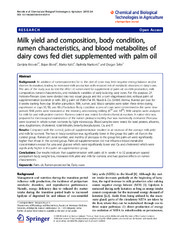Приказ основних података о документу
Milk yield and composition, body condition, rumen characteristics, and blood metabolites of dairy cows fed diet supplemented with palm oil
| dc.creator | Kirovski, Danijela | |
| dc.creator | Blond, Bojan | |
| dc.creator | Katić, Marko | |
| dc.creator | Marković, Radmila | |
| dc.creator | Šefer, Dragan | |
| dc.date.accessioned | 2020-06-03T13:57:49Z | |
| dc.date.available | 2020-06-03T13:57:49Z | |
| dc.date.issued | 2015 | |
| dc.identifier.issn | 2196-5641 | |
| dc.identifier.uri | https://vet-erinar.vet.bg.ac.rs/handle/123456789/1236 | |
| dc.description.abstract | Background: An addition of rumen-protected fat to the diet of cows may limit negative energy balance and/or shorten its duration, leading to increased milk production with reduced risk of metabolic disorders in dairy cows. The aim of the study was to test the effect of rumen-inert fat supplement of palm oil on milk production, milk composition, rumen characteristics, and metabolic variables of early lactating dairy cows. For this purpose, 24 Holstein-Friesian cows were divided into two equal groups and fed a corn silage-based diet, without palm oil supplementation (control) or with 300 g palm oil (Palm Fat 99, Noack & Co. GmbH, Vienna, Austria) per cow for 8 weeks starting from day 30 after parturition. Milk, rumen, and blood samples were taken three times during experiment at days 30, 58, and 86 of lactation. Body condition scores of cows were determined in the same time periods. Milk yields were measured at the morning and evening milking (6(00) and 18(00)). Milk samples were analyzed for milk fat and milk protein content. Rumen content was tested for electrochemical reaction. A native slide was prepared for microscopical examination of the rumen protozoa motility that was numerically estimated. Protozoa were counted in whole rumen contents by light microscopy. Blood samples were tested for total protein, albumin, urea, tryglicerides, cholesterol, total bilirubin, beta-hydroxybutyrate, Ca, and P. Results: Compared with the control, palm oil supplementation resulted in an increase of the average milk yield and milk fat content. The loss in body condition was significantly lower in the group fed palm oil than in the control group. Rumen pH, total number, and motility of protozoa in the group fed palm oil were significantly higher than those in the control group. Palm oil supplementation did not influence blood metabolite concentrations except for urea and glucose which were significantly lower and Ca and cholesterol which were significantly higher in the palm oil-supplemented group. Conclusions: Our results indicate that supplementation with palm oil in weeks 4 to 12 postpartum spared postpartum body weight loss, increased milk yield and milk fat content, and had positive effects on rumen characteristics. | en |
| dc.publisher | Springeropen, London | |
| dc.rights | openAccess | |
| dc.rights.uri | https://creativecommons.org/licenses/by/4.0/ | |
| dc.source | Chemical and Biological Technologies in Agriculture | |
| dc.subject | Palm oil | en |
| dc.subject | Rumen-protected fat | en |
| dc.subject | Dairy cows | en |
| dc.title | Milk yield and composition, body condition, rumen characteristics, and blood metabolites of dairy cows fed diet supplemented with palm oil | en |
| dc.type | article | |
| dc.rights.license | BY | |
| dcterms.abstract | Блонд, Бојан; Марковић, Радмила; Катић, Марко; Шефер, Драган; Кировски, Данијела; | |
| dc.citation.volume | 2 | |
| dc.citation.spage | UNSP 6 | |
| dc.citation.other | 2: UNSP 6 | |
| dc.identifier.wos | 000449143000006 | |
| dc.identifier.doi | 10.1186/s40538-014-0029-6 | |
| dc.identifier.scopus | 2-s2.0-84981723246 | |
| dc.identifier.fulltext | https://vet-erinar.vet.bg.ac.rs/bitstream/id/214/1235.pdf | |
| dc.type.version | publishedVersion |

